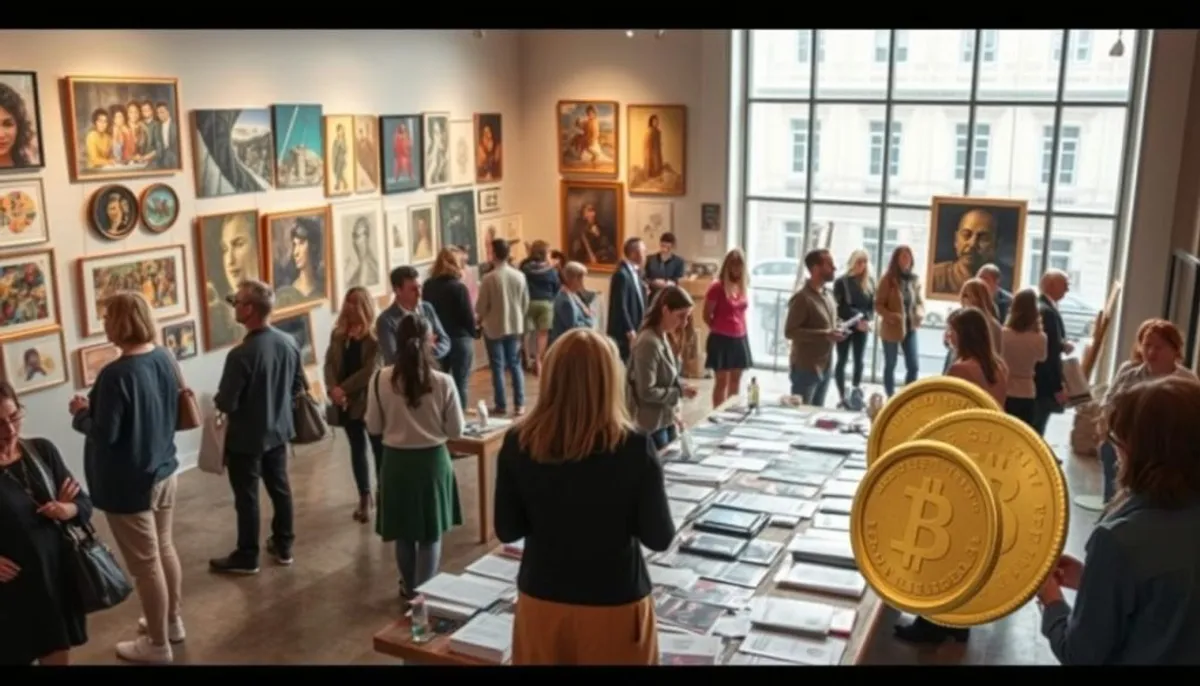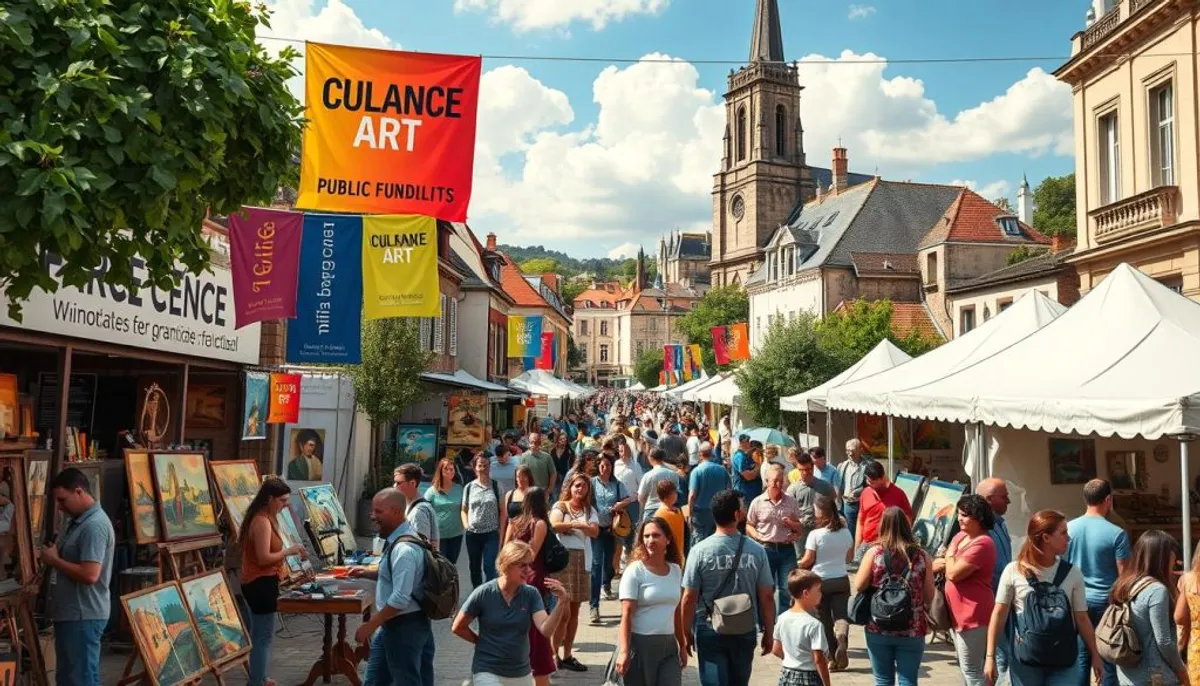The French cultural sector plays a crucial role in the national economy. In 2019, it generated 49.2 billion euros, highlighting its importance. It encompasses various fields, such as live performance, heritage, and video games.

The French state invests heavily in culture. Annually, 17 billion euros are allocated to this sector. The Ministry of Culture contributes with 3.6 billion. Local authorities also provide 8.7 billion euros.
Obtaining cultural grants may seem complex. However, multiple options are available. Creation aids cover several areas: public grants, corporate sponsorship, and crowdfunding. Crowdfunding, in particular, has gained popularity for artistic projects.
Whether you are an artist, producer, or event organizer, it is crucial to understand these mechanisms. This article will guide you through cultural funding in France.
The landscape of cultural funding in France
The cultural economy in France occupies a central place in our economic landscape. It encompasses a multitude of fields, from live performances to video games, including heritage and visual arts. This diversity underscores the importance of supporting this sector.
The economic importance of the cultural sector
The cultural sector receives significant financial support. Over the past five years, more than 3 billion euros have been allocated to culture. This support comes from the France 2030 program, with substantial investment credits. The “New Worlds” initiative, endowed with 30 million euros, has supported 264 projects, involving 430 artists.
The different types of funding available
Funding sources for cultural projects are varied. They include public grants, corporate sponsorship, and crowdfunding. Grants come from the state and local authorities. Corporate sponsorship offers tax benefits, with a tax reduction of up to 60% of the donation amount.
The role of public and private stakeholders
Many stakeholders play a key role in cultural development in France. Alterincub', Aquitaine Culture, and Artishoc support cultural projects. La Ruche, a network of social innovation incubators, supports the School of Lab, a support program for media, art, and culture project leaders. These initiatives demonstrate the synergy between public and private actors in supporting the cultural economy.
| Type of funding | Characteristics |
|---|---|
| Public grants | From the state and local authorities |
| Corporate sponsorship | Tax reduction up to 60% of the donation |
| Crowdfunding | Participatory funding from the general public |
Public funding sources
In France, public funding is essential to support cultural projects. Public grants, whether direct or indirect, are crucial for many artistic and cultural projects. They constitute a fundamental resource, thus promoting solidarity creativity.
Grants from the State and the Ministry of Culture
The Ministry of Culture plays a key role in cultural funding. In 2022, its budget reached 4.1 billion euros, a 9% increase from the previous year. The DRAC, representing the ministry in the regions, manages a portion of these grants.
The support of local authorities
Local authorities, such as regions, departments, and municipalities, provide significant financial support. Regional aids vary according to local priorities and attribution criteria. They can be direct financial aids or resources made available.
European funding programs
European funds offer additional opportunities for cultural projects. The Creative Europe program, for instance, provides funding from 2021 to 2027. These European grants can complement national and local aids.
| Source of funding | Amount (in billions of euros) | Percentage of total |
|---|---|---|
| Ministry of Culture | 4.1 | 44% |
| Other ministries | 5.2 | 56% |
| Total | 9.3 | 100% |

To access these funds, project leaders often need to form an association or company. Operating grants are awarded for specific projects. A performance agreement is established between the structure and the funding organization.
How to find funding for a cultural project
The search for funding for a cultural project requires meticulous preparation and a thorough understanding of eligibility criteria. Project initiators must stay informed about calls for cultural projects and the various funding opportunities available.
Preparing a grant application
A well-structured grant application is crucial to obtaining funding. It should include a detailed description of the project, its objectives, its cultural and societal impact, as well as a precise budget. The HelloAsso platform provides tools to create tailored offers and effectively manage cultural events.
The eligibility criteria to meet
Each funding organization has its own eligibility criteria. It is essential to review them carefully before submitting an application. Projects must generally demonstrate their artistic value, economic feasibility, and impact on the public.
| Type of funding | Amount | Characteristics |
|---|---|---|
| Crowdfunding | Variable | 100% of funds returned even if the goal is not reached |
| Consumer credit | 200 to 75,000 € | Suitable for individual artistic projects |
| Mortgage loan | High | Uses real estate as collateral |
The timeline and deadlines to anticipate
Time management is essential in the funding process. Evaluation procedures can take several months. It is advisable to start the steps well in advance and to strictly adhere to the deadlines of calls for cultural projects.

By diversifying funding sources and utilizing tools such as online ticketing or crowdfunding, project initiators increase their chances of success. It is also wise to consult an expert to optimize their grant application and maximize funding opportunities.
Alternative and private funding
Cultural projects can benefit from various sources of private funding. Cultural sponsorship, participatory funding, funding for artistic projects, and artistic foundations offer interesting opportunities to support creation. These options allow for diversification of funding sources, thus providing greater flexibility for artists and creators.
Corporate sponsorship and its tax benefits
Cultural sponsorship allows companies to support artistic projects while benefiting from tax advantages. Sponsors can deduct up to 60% of their donation. Beyond the financial aspect, they get involved in initiatives they are passionate about. This form of support is therefore beneficial for both the company and the artist.
Crowdfunding and participatory funding
Participatory funding is gaining popularity for cultural projects. Platforms like HelloAsso allow for fundraising from the general public. This method requires an effective communication strategy to reach potential donors. It offers a unique opportunity to mobilize a wide range of support, and the cado culture bimpli tips can also play a key role in this dynamic.
Foundations and professional organizations
Many artistic foundations support creation:
- The BNP Paribas Foundation funds contemporary dance and music
- The Carasso Foundation prioritizes citizen art and innovation
- The Audiens Foundation supports the dissemination of performances to vulnerable audiences
Organizations like Sacem also offer funds for musical creation. These foundations and organizations provide targeted support, often accompanied by valuable expertise for cultural projects.
| Type of funding | Advantages | Points of caution |
|---|---|---|
| Sponsorship | Tax benefits, commitment | Careful management required |
| Participatory funding | Wide audience, flexibility | Intensive communication required |
| Foundations | Targeted support, expertise | Strict selection criteria |
The search for private funding requires time and resources. It is recommended to designate a dedicated person and develop a suitable strategy to maximize the chances of success. A well-planned approach is essential to navigate this complex landscape effectively.
Conclusion
The cultural funding strategy in France faces major challenges. The decrease in state allocations forces project initiators to explore new funding avenues. Public grants, while vital, no longer cover all the needs to ensure the sustainability of artistic initiatives.
It is crucial to understand the various options available. From corporate sponsorship to participatory funding, as well as microcredits offered by platforms like Younited Credit, there are many alternatives. Preparing a solid application is imperative to persuade potential investors.
The future of cultural funding relies on a hybrid strategy. Project promoters must navigate between public grants, private support, and financial innovations. This diversification of sources, combined with precise management, is essential to ensure the sustainability and social impact of cultural initiatives in France.
RelatedRelated articles


